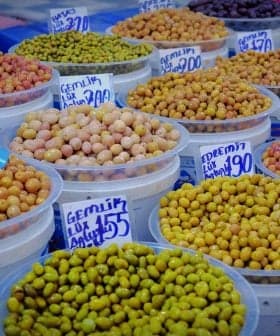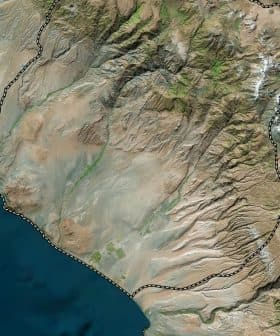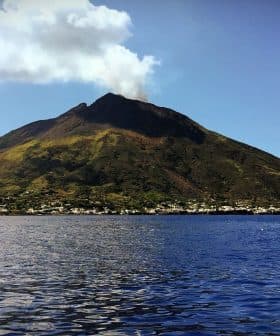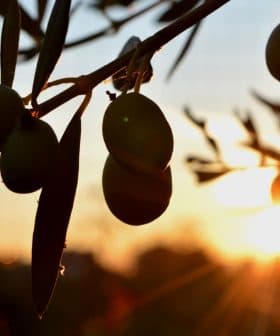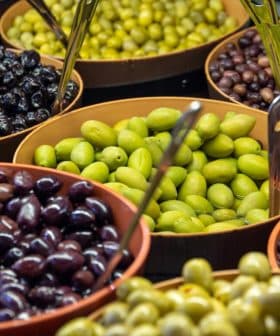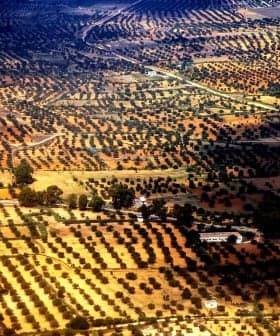Production in Turkey Stumbles After Bad Harvest, but Trends Upwards
Even as some predict Turkey could become the world’s second largest olive oil producer, the country’s changing climate is forcing olive farmers and producers to do things they have never needed to do before.
 View of Aegean sea and landscape in Ayvalik, Turkey.
View of Aegean sea and landscape in Ayvalik, Turkey.Despite a 37 percent dip in olive oil production for the 2018/19 crop year, Turkey is trending towards an increase in yield, with estimated production of 183,000 tons, driven by massive planting programs and the maturation of olive trees. However, the effects of climate change, including a hot and dry summer causing early ripening and fruit drop, are leading to production decreases and potential future challenges for Turkish olive oil producers.
Olive oil production in Turkey dipped by 37 percent for the 2018/19 crop year, according to data provided to Olive Oil Times by the International Olive Council (IOC).
We believe that our yield will increase much more according to the number of trees and we will consequently achieve the target of world’s second producer.
However, Turkish olive oil production is trending upwards and, in spite of his year being an off-year in the world’s fifth-largest olive oil producing country, the yield is estimated to be higher than it was in three of the past four harvest seasons.
The IOC estimated that Turkey will produce 183,000 tons of oil this crop year, a 2.8 percent increase compared with the previous off-year harvest (2016/17) and a 14.4 percent increase compared with the off-year before that (2014/15).
This steady increase has been fueled by the Ministry of Forestry and Agriculture’s massive planting programs that have taken place over the better part of the past two decades.
See Also:The best olive oils from Turkey
“Turkey has had an increase in its olive tree population in the past 10 to 15 years,” Chris Dologh, the general manager at Kristal Oil and board member of the IOC, told Olive Oil Times. “Now we are second after Spain in terms of the number of olive trees planted.”
Many of these trees, which were planted as saplings, are now entering full maturity. This, Dologh points out, has fueled the recent boom in olive oil production.
Last year, Turkey produced a record high 263,000 tons. This was the second time the country has exceeded the 200,000-ton benchmark, with the last time being back in 1996/97. Dologh believes that soon Turkey will exceed this benchmark every year, even in off-years.
However, to do that, he acknowledged, Turkish producers will need to use more industrial agricultural practices.
“Since production is still not done at the industrial level like it is in Spain, the production yield is not as high as it could be,” Dologh said.
Ümmühan Tibet, the chairman of the board of Turkey’s Olive and Olive Oil Council (UZZK, as it is known by its Turkish initials), believes that Turkey has the potential to become the world’s second-largest producer of olive oil, but also acknowledged that climate change will ultimately determine the sector’s future success.
“Our olive industry has been continuously developing after newly planted saplings began producing fruits,” Tibet told Olive Oil Times. “We believe that our yield will increase much more according to the number of trees and we will consequently achieve the target of world’s second producer with this olive oil production amount.“
“However, this development can’t be completely reflected on production figures due to the effect of global warming and adverse weather conditions experienced for the last four to five years,” she added.
This year, Turkish producers especially felt the effects of climate change. An unusually hot and dry summer caused olive trees to drop their fruit a month earlier than expected, meaning the harvest began in September instead of October.
“The olives ripened early due to hot and dry summer. Most of the olives were black even in mid-late September in some areas,” Bahar Alan, co-owner of Ayvalık-based Nova Vera, told Olive Oil Times. “The weather was too warm until the end of October, which was not good for the early harvested olive oils especially.”
Alan expects a production decrease by as much as 30 percent this year, much of which he attributed to the dry weather. A recent climate report published by the Istanbul Policy Center, an independent research institute, concluded that key agricultural regions in Turkey will likely continue to dry out.
“Currently, the country is experiencing a period of drought, and climate projections indicate a fall in water potential,” the report said. “Additionally, the Aegean Region, one of the most important regions for fruit production, will be also adversely affected as a result of temperature increase.”
If this trend continues, Alan said he will begin installing drip irrigation systems on his trees, which are located in the northern Aegean region. These trees, Alan said, have never needed irrigation before.
“We are planning to implement irrigation systems in these groves as well to protect the product quality,” he said. “We hope that 2019/20 will be a better year.”
Farther south of Ayvalık, in the southwestern corner of the Aegean region, Merve Doran, the co-owner of Oleamea, experienced substantial losses as well.
“In terms of both quality and quantity, it wasn’t as good compared to last year,” she told Olive Oil Times. “We were not surprised, but still very much disappointed with the results.”
Doran attributed these losses not only to the dry summer, but also to a whole slew of other climate irregularities.
“Because of the shifting in the seasons, spring rainfall arrives later than it used to and this delays our timing for the harvest period,” she said. “Also, we were hit by heavy rainfall and freeze, which reduced the size of our crop.”
Like Alan, she believes the crop will rebound in 2019/20, but does not hold an overly optimistic view of the sector’s future.
“Compared to this year, yes we expect a rebound for the 2019/20 harvest year,” she said. “However again, compared to a decade ago, it is not going to be the same. As people who deal with agriculture day-to-day know, the true value of soil, water and weather, is never going to be like the old times.”
While not directly acknowledging these sentiments, Ümmühan Tibet said that climate change is something that all IOC member states will need to address and she sees common ground for cooperation on this front.
“Undoubtedly, climate change is also adversely affecting other traditional olive producing countries located in the Mediterranean region like our country,” she said. “In this respect, we have to research how we can [mitigate the effects] of climate change, and tell our producers the results of this research.”


